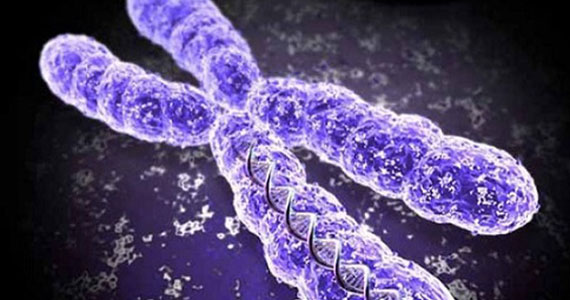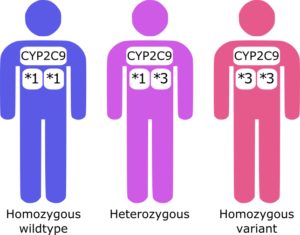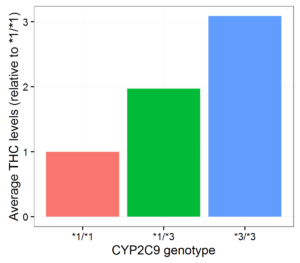
Some people are more sensitive to cannabis than others. Specific genetic variations have recently been linked to THC metabolism and cannabis sensitivity.The field that studies how your genes affect your response to drugs is called pharmacogenetics – and it is exploding!There are so many different proteins that affect how you can respond to cannabis:Drug metabolizing enzymes control how quickly cannabinoids like THC and CBD are eliminated from your bodyDrug transporters control how much THC penetrates into your brainCannabinoid CB1 and CB2 receptors and their downstream cellular signaling systems control the effect of cannabinoidsEvery one of these proteins is encoded by a gene. Each gene has variations at specific locations called genetic polymorphisms.Today we will explore a polymorphism in the CYP2C9 gene which can significantly affect your sensitivity to cannabis. If you know someone who gets high really easily, this may explain why! THC metabolism by CYP2C9It is worth reading more about how your body metabolizes cannabinoids such as THC. However, here is a summary:Your body (specifically your GI tract and your liver) express drug metabolizing enzymes. These enzymes chemically modify drugs in an attempt to detoxify them and remove them from your body.Below is the main metabolic pathway of THC. THC is metabolized to the psychoactive metabolite 11-OH-THC. 11-OH-THC is further metabolized to the inactive metabolite THC-COOH.

Both of these metabolic steps are performed primarily by the same drug metabolizing enzyme called CYP2C9. Therefore, any difference in activity of the CYP2C9 enzyme may cause a change in THC metabolism.
Genetics of CYP2C9
The gene for CYP2C9 has more than 50 polymorphisms, some of which change enzyme activity. The wild-type version (i.e. the most common version) of the gene is called CYP2C9*1. There is a specific polymorphism that has significance for drug metabolism called CYP2C9*3. The CYP2C9*3 variant has significantly decreased enzyme activity.
Because every person has two versions of each gene (one inherited from your mother and one from your father), you may have two copies of the *1 variant, two copies of the *3 variant, or one copy of each.

The CYP2C9*3 polymorphism is relatively common in people of European descent. It is estimated to be 3.3 – 16.2% of all genes in this population (this is called the allele frequency). It is much more rare in other populations. For example, the allele frequency is 0 – 2.3% in Africans and 1.1 – 3.6% in Asians.
Effect of CYP2C9*3 on THC metabolism
The first study to assess the effect of CYP2C9*3 on THC metabolism used isolated enzymes in a lab. They showed that the ability of the *3 version of CYP2C9 to metabolize THC was only 27% of the *1 version.

The decreased metabolism of THC by CYP2C9*3 brought up many questions. Would people who were homozygous for the *3 version (meaning they had two copies of the *3 gene) have much higher levels of THC in their body because of slower metabolism? The answer came 4 years later when a clinical study was published.
Effect of CYP2C9*3 on THC pharmacokinetics and pharmacodynamics
This clinical study investigated the pharmacokinetics (blood levels) and pharmacodynamics (sleepiness) of 43 subjects administered a single oral dose of 15 mg THC. All subjects were genotyped to determine their CYP2C9 polymorphisms.
As was expected from the above lab data, subjects with the *3/*3 genotype had 3-fold higher THC levels in their blood than subjects with the *1/*1 genotype. Those subjects with one copy of each gene (*1/*3) had intermediate THC levels that were about 2-fold higher than subjects with *1/*1.

Interestingly, 11-OH-THC levels were not significantly different in subjects of different CYP2C9 genotypes. This is probably because 11-OH-THC is both formed by CYP2C9, but also metabolized by CYP2C9. So any change in CYP2C9 activity may cancel itself out.
Given the higher THC blood levels, it is not surprising that subjects with the *3/*3 genotype also had a significantly greater pharmacodynamic effect. Subjects with the *3/*3 genotype felt more drowsy and this feeling lasted for a longer time than wild-type subjects.
Implications of CYP2C9 pharmacogenetics for cannabis consumption
CYP2C9 is probably the most important enzyme for the metabolism of THC. A solid scientific study has shown that people with CYP2C9*3 genotypes have higher blood levels of THC and experience a stronger effect after cannabis consumption. This polymorphism helps explain why some people are naturally more sensitive to cannabis than others.
This study was performed with an oral dose of THC and there may be a different effect after smoking cannabis. After an oral THC dose, metabolism starts in the GI tract and liver before THC makes it to the general circulation, so CYP2C9 variants will affect both how high you get as well as the duration. After smoking cannabis, CYP2C9 variants will have little effect on how high you get since the lungs deliver THC directly to the blood. However, the CYP2C9 variants will still have an effect on the duration of the high.

Origen: How your genes affect your cannabis high: The case of CYP2C9


